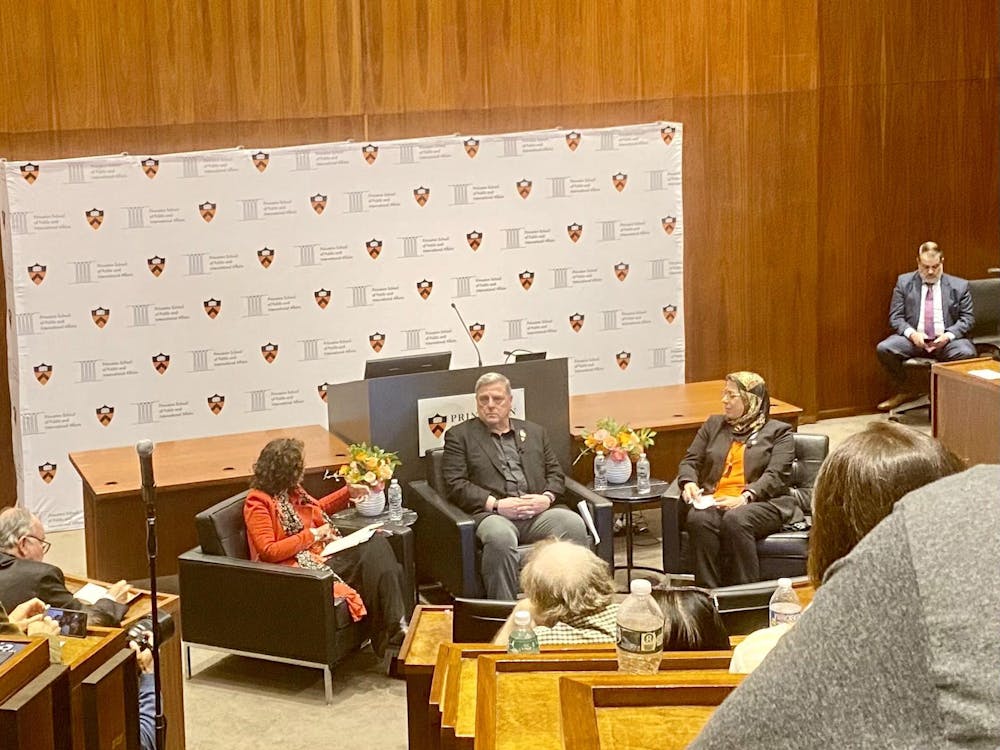On the evening of Wednesday, Oct. 2, the Princeton School of Public and International Affairs (SPIA) hosted retired United States Army general Mark Milley ’80 for a fireside chat focusing on the aftermath of the U.S. withdrawal from Afghanistan and regional security in the Middle East more broadly. Milley's talk marks the fourth speaker in the SPIA Dean’s Leadership Series this fall, following visits from the presidents of the Maldives and Paraguay last week.
An ROTC cadet and politics student while at Princeton, Milley served as the 20th Chairman of the Joint Chiefs of Staff and has held multiple command positions throughout his 44-year career. In February, Milley was appointed as SPIA’s Charles and Marie Robertson Visiting Professor, a position that will run through June 2025. The talk, moderated by SPIA Dean Amaney Jamal and Professor Razia Iqbal, drew over 200 attendees to Robertson Hall.
When questioned about whether the United States’ presence in Afghanistan amounted to a “moral failure,” Milley instead highlighted the 9/11 attacks and the ongoing threat posed by Al-Qaeda.
“I think that it was a very long and good 20 years. But at the end of the day, the Taliban occupied the capital city and took the country over,” Milley said. He also recognized the strategic and political shortcomings of the U.S. withdrawal. “There’s many, many lessons that have come out of our experience in Afghanistan. It’s going to take years for professional historians to mine those lessons — it’s going to take quite a while to get all the flesh out,” Milley said.
Iqbal then asked him if anything could have been done differently from the beginning to prevent Afghanistan’s current situation. He again directed the audience’s focus to the 9/11 attacks, sharing a personal memory of being awakened in the early morning to see the attacks unfold on television.
“That’s not to say we didn’t make mistakes,” Milley continued. “I think the very first mistake we made was we didn’t kill Bin Laden in the winter of ’01 or ’02. We had him basically within our sights more or less.” He also pointed out the strategic shortcomings of the Bonn Agreement and noted that the U.S. military’s lack of language proficiency before deployment was “exploited at the village level” by the Taliban “in ways that [they] were not able to adequately see.”
Iqbal later asked Milley what he would say to a 21-year-old woman in Afghanistan, to which he responded, “There’s not much I can say. It’s a tragedy beyond description.” While addressing the ongoing humanitarian crisis in Afghanistan, Milley emphasized the distinction between nation-building and military duties, and said that nation-building is “not the core, fundamental task and responsibility of militaries.” He also noted that political legitimacy has been a longstanding issue in Afghanistan, predating the U.S. invasion.
The discussion then turned to the war in Gaza, where Jamal asked Milley if he was concerned about potential escalation and which group or nation he believed might step in to fill the power vacuum in the Middle East.

“The idea of expanding the war — it’s happened. The war has expanded,” Milley said. “The question is, how do you get off the escalation ladder before it turns into a very broad regional conflict that would be arguably catastrophic to the region, perhaps, and definitely disruptive to the outside of the region?” Israel has launched an ongoing bombing campaign in Lebanon this week, and Iran fired waves of missiles at Israel on Tuesday.
As a way forward, Milley proposed an Arab-led military force for peace enforcement in Gaza while acknowledging the limitations of U.S. leverage in the region, given a misalignment of national security interests.
The fireside chat concluded with an audience Q&A. Wolfgang Danspeckgruber, the founding director of the Liechtenstein Institute on Self-Determination (LISD) at Princeton, asked Milley about methods for eliminating extremist ideologies and identifying the fundamental, root causes of terrorism.
“You have to offer alternatives, and you have to solve the fundamental issues that are at stake in the society that’s giving birth to these terrorist organizations,” Milley said. “The only way you can resolve to defeat an idea is with a better idea and address the grievances and the perceived grievances, the perceived disenfranchisement from the people that are at stake.”

“One of the important takeaways from this discussion was that deterrence only is not really effective,” Abdullah Azizi, an Afghan graduate student from Rutgers University, told The Daily Princetonian. Azizi also highlighted Milley’s comments on root cause analysis as particularly insightful.
Milley also faced some criticism regarding his past military decisions.
A Princeton alum asked Milley during the Q&A about why he “lied to the American public in order to sustain the Afghanistan War.” Milley started to address the question but was interrupted by the same attendee with a comment about the U.S.’s involvement in opium exports. The alum’s microphone was then turned off.
Before the talk began, flyers of Milley’s face printed in red ink alongside words such as “warmonger” and “lied to Congress” were passed to attendees by members of the public at the entrance of Robertson Hall.
The Dean’s Leadership Series continues with United Nations Special Rapporteur on the Occupied Palestinian Territories Francesca Albanese on Oct. 29.
Sena Chang is a News contributor for the ‘Prince.’
Please send corrections to corrections[at]dailyprincetonian.com.








